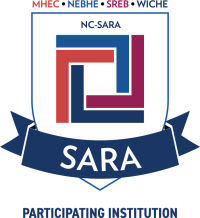There are many benefits to teaching and learning online. Online courses increase access to education for many students by providing a flexible approach to teaching and learning. Students may learn at their own pace and access course materials off campus. There are many digital technologies that facilitate effective online learning environments.
Distance Learning for Students
How do you know if you are ready to take an online course? Online learning may introduce unique challenges.
- Technology Resources: Do you have access to the right technology?
- The Classroom: How does online learning work? How is a virtual classroom different than a physical classroom?
- Balance: Does anytime anywhere mean all of the time everywhere? How should you manage your time to be successful?
- Brightspace: Where can you learn more about how to use this valuable tool?
- Course Modalities at CSI
Technology Resources
Be sure you are familiar with the requirements for each online course you take. For example,
- A finance course may require that you have access to a recent version of Microsoft Excel.
- A communications course may require PowerPoint and access to a webcam or microphone.
- Online Education at CUNY
- CUNY Online Degrees
What technology will you require to succeed in an online course?
- A working computer
- Up-to-date software
- A webcam, microphone, and speakers (or headphones)
- A fast, reliable internet connection
- Access to Brightspace
- Login for Brightspace
- Access to a CUNY Zoom account.
Computer Skills
- You should be comfortable learning on a computer and troubleshooting technology issues that may come up. Obstacles are going to come up that will challenge your patience.
- Visit an Open Computer Lab for technology support or attend a Technology Literacy Workshop to improve your technology skills.
Distance Learning for Faculty
There are many benefits to teaching and learning online. Online courses increase access to education for many students by providing a flexible approach to teaching and learning. Students may learn at their own pace and access course materials off campus. There are many digital technologies that facilitate effective online learning environments.
- What is the difference between online, blended and other delivery formats?
- An online course is conducted entirely using a learning management system. The online format is the primary method to deliver the course materials. Students and faculty never meet in the physical classroom.
- "Hybrid" or "Blended" are names commonly used to describe courses in which some traditional face-to-face has been replaced by online learning activities making it possible to reduce the amount of time spent in the classroom. Traditional face-to-face instruction is reduced but not eliminated.
- A web/technology enhanced courses may have a course website or some instructional activities online, these supplement but do not replace face-to-face coursework. Students continue to meet in the classroom for the standard number of scheduled hours for that course.
- Course Modalities at CSI
- Online Teaching Technologies at CSI
- Resources for Faculty
Distance Learning Complaints

The College of Staten Island participates in the State Authorization Reciprocity Agreements.
Are you enrolling or enrolled in one of these programs at CSI?
- 100% online programs
- Online programs with field experiences
- Programs leading to professional licensure in another state
If yes, please be aware of the following information on this page.
NC-SARA
The College of Staten Island (CSI) is approved to participate in the National Council for State Authorization Reciprocity Agreements (NC-SARA). SARA is an agreement amongst member states to establish comparable national standards and streamline regulations around distance education programs. NC-SARA participation makes it easier for students to access distance education programs across state lines. Learn more about how NC-SARA benefits me as a student
Professional License Disclosures
Based on the U.S. Federal Regulation, 34 CFR §668.14 and §668.43, and in compliance with SARA, it is required to notify prospective and current students as to whether courses or programs that lead to professional licensure will meet the professional licensure requirements in the state where the students reside. If you reside outside of New York State and are interested in one of CSI’s programs that lead to licensure, please review the professional license disclosures.
Complaints Related to Distance Learning
Complaints Related to Grades, Discrimination, or Harassment
CSI students, including those enrolled in distance learning courses, who would like to submit their concerns related to grades, discrimination, or harassment should follow the CSI Student Grievance process. Concerns can be submitted to the CSI Office of Student Affairs or to the Office of Diversity, Equity and Inclusion.
Complaints Related to Distance Learning
Students who have concerns about their distance learning experiences can follow the procedures below:
- Submit concerns to the CSI Office of Student Affairs, using the following form: Student Concern Form. These procedures are guided by CUNY’s Manual of General Policy (Policy 5.20) and applies to all academic settings, online and in-person.
- If it is felt the complaint is not resolved by CSI, then an appeal can be directed to the CUNY Office of Student Advocacy and Referral:
City University of New York
Office of Student Advocacy and Referral
205 East 42nd Street
New York, NY 10017
studentaffairs@cuny.edu - Further appeal can be addressed by the New York State Department of Education (NYSED).
Once the complaint is handled by the NYSED, NC-SARA is notified of the final complaint disposition. Only those complaints resulting from distance education courses, programs, and activities are covered by NC-SARA. For more information on the NC-SARA student compliant process can be found here:. Resolutions of complaints by SARA apply to interstate distance education offerings by participating SARA institutions to students in other SARA states. In-state complaints will be resolved under the state’s policies. SARA policies do not cover complaints related to grades or student conduct violations. For SARA related complaints, students have two years to submit.
Accessibiltiy in Distance Learning
Reasonable Accommodations: A Faculty Guide for Teaching Students with Disabilities resource was developed specifically for CUNY faculty to provide them with information and best practices to be most effective in meeting the needs of students with disabilities and achieving the goal of equal access. This guide includes helpful information in accommodating students with disabilities in distance learning, including the following two sections:
This page contains resources to ensure distance learning is accessible to learners of all abilities.

